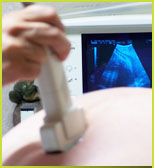| ||||||||||||||||||||||||||||||||||||||||
Preterm Labor
Labor that begins before the end of the 37th week is considered "preterm" or "premature." Approximately 1 out of every 10 babies born in the United States is preterm. No one knows the exact cause of preterm labor, but certain situations increase the odds for it, including:
- Preeclampsia, a form of high blood pressure that can develop in the second half of pregnancy.
- Maternal health problems such as kidney disease, diabetes, or heart disease.
- Multiple pregnancy. About 97% of twin pregnancies, for instance, result in preterm labor.
- Problems with the placenta, such as placenta previa or placenta abruptio.
- Problems with the uterus, such as structural defects, an incompetent cervix, or fibroids.
- Past preterm labor or delivery.
- Short intervals (less than a year) between pregnancies.
- Being younger than 18 or older than 40 during pregnancy.
- PPROM (Preterm Premature Rupture of Membranes).
Other possible culprits include vaginal infections, poor nutrition, stress, depression, smoking, and alcohol and drug abuse.
Though prematurity is still one of the leading causes of infant death and disability in this country, medical advancements -- coupled with good prenatal care -- have drastically improved the chances that your baby will do well.
How Do I Know If I'm Having Preterm Labor?
Call your health care provider right away if you notice any of these signs before your 37th week of pregnancy:
- More than five contractions per hour, or contractions that get longer, stronger, and closer together
- Abdominal cramps, pain, or pressure
- Lower back pain
- Spotting, bleeding, mucous, or watery discharge from your vagina
- Ruptured membranes
If your doctor suspects preterm labor, she'll do an exam to see if your cervix has dilated or your water has broken, and may gauge your contractions with a uterine monitor. You may also have a test called fetal fibronectin. This test assesses fluid from your vagina and gauges the chances that you will deliver early. If the test is negative, you can be 99 percent sure that you will not deliver in the next week. If it’s positive, it’s less helpful. A positive test means about 1 in 5 women will deliver in the next one to two weeks.
What Will Happen If My Baby Is Born Early?
If labor can't be stopped or you need to deliver early for another reason, your baby is at increased risk for a number of health problems, including:
- Respiratory distress syndrome (RDS) and other breathing problems caused by immature lungs
- Low birth weight (less than 5.5 pounds)
- Difficulty sucking and swallowing
- Bleeding in the brain, caused by underdeveloped blood vessels
- Digestive problems and infections that make it difficult to keep milk or formula down
- Jaundice, a yellowing of the baby's skin caused by an excess of bilirubin in her blood
Since a baby born too soon also has trouble maintaining her body temperature, your newborn may be kept in an isolette (an incubator) that helps her stay warm. If she has difficulty breathing, the doctor may insert a breathing tube and supply oxygen with a respirator. If sucking and swallowing problems prevent her from feeding, the doctor may place a feeding tube into her stomach to provide her with nourishment. Extremely premature babies may need to be fed intravenously.
If you are hospitalized with preterm labor, ask to talk with the pediatricians who specialize in caring for preterm babies (also called neonatologists). They can help you understand the potential risks for your baby, based on how far along you are in your pregnancy.
How Can I Prevent Preterm Labor?
Getting early, regular prenatal care lowers the odds of preterm birth. See your health care provider as soon as you suspect you're pregnant (or, even better, before you conceive) and get regular checkups throughout your pregnancy. Eat healthy foods and avoid cigarettes, alcohol, and drugs. Finally, talk to your health care provider about other ways to ensure a healthy pregnancy.
When Can I Take My Baby Home?
That depends on how much treatment she needs. Most likely, your baby will stay in the hospital until she passes the five-pound mark and can breathe, eat, and maintain her body temperature on her own. This is often around the time of your original due date. Hospitalization could last days, weeks, or even months after delivery (depending on how early she was born). That means you'll probably go home before she does. Leaving your baby behind can be very stressful, so ask hospital personnel about counseling and other services available to you during this difficult time. You can also be with your baby in the hospital. Most neonatal intensive care units (NICUs) allow parents to visit for extended periods of time.
If your baby has to stay in the hospital, you can help her get the best start by giving her your breast milk. Hospital experts can help you learn how to pump milk for your baby and bring it to her. Breast milk reduces a preterm baby’s risk of necrotizing enterocolitis, a potentially fatal bowel problem, and helps protect him from infection. It’s also a way you can stay connected to your baby while he is in the hospital – and help get him home as early as possible.
|
Review Date:
12/9/2012 Reviewed By: Irina Burd, MD, PhD, Maternal Fetal Medicine, Johns Hopkins University, Baltimore, MD. Review provided by VeriMed Healthcare Network. |



